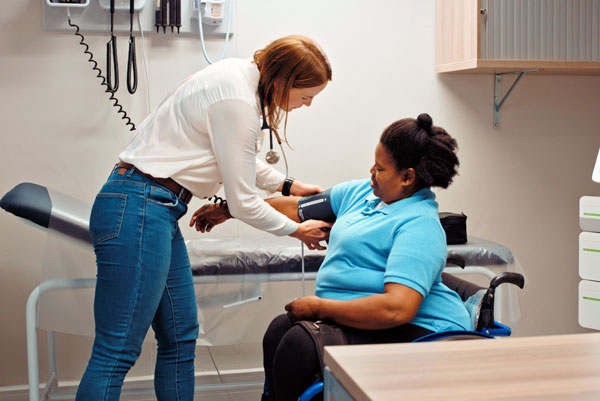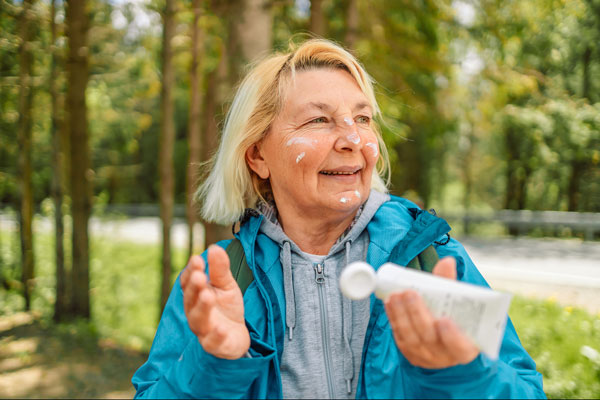 The Wellness Coalition has been working to increase access to health and wellness resources that can help people prevent and/or manage chronic conditions. From nutrition and breastfeeding to diabetes prevention and heart health, our myriad of services can support residents and businesses as we work together to make the River Region a healthier place to live.
The Wellness Coalition has been working to increase access to health and wellness resources that can help people prevent and/or manage chronic conditions. From nutrition and breastfeeding to diabetes prevention and heart health, our myriad of services can support residents and businesses as we work together to make the River Region a healthier place to live.
Now, as the days get shorter and cooler and the seasons change, you can use these strategies to help prevent chronic diseases and maintain a healthy lifestyle.
Get Your COVID-19 and Flu Shots
Getting the COVID-19 vaccine and recommended boosters offers the best protection against serious illness and hospitalization. The Centers for Disease Control and Prevention (CDC) recommends a yearly flu vaccine as the first and most important step in protecting against flu viruses.

Get Your Screenings
Regular checkups are separate from any other doctor’s visit for sickness or injury. In addition to physical exams, these visits focus on preventive care, such as:
- Screening tests, which are medical tests to check for diseases early, when they may be easier to treat
- Services, like vaccines (shots), that improve your health by preventing diseases and other health problems
- Dental cleanings
- Education and counseling to help you make informed health decision

Brush Your Teeth
You can keep your teeth for your lifetime. Here are some things you can do to maintain a healthy mouth and strong teeth:
- Drink fluoridated water and brush with fluoride toothpaste.
- Practice good oral hygiene.
- Brush teeth thoroughly twice a day and floss daily between the teeth to remove dental plaque.
- Visit your dentist at least once a year, even if you have no natural teeth or have dentures.
- Do not use any tobacco products.
- Limit alcoholic drinks.
- If you have diabetes, work to maintain control of the disease. This will decrease risk for other complications, including gum disease. Treating gum disease may help lower your blood sugar level.
- If your medication causes dry mouth, ask your doctor for a different medication that may not cause this condition. If dry mouth cannot be avoided, drink
plenty of water, chew sugarless gum, and avoid tobacco products and alcohol. - When acting as a caregiver, help older individuals brush and floss their teeth if they are not able to perform these activities independently.

Clothing and Sunscreen
Spending time outside is a great way to be physically active, reduce stress, and get vitamin D. You can work and play outside without raising your skin cancer risk by protecting your skin from the sun.
Be sun-safe by wearing long-sleeved shirts and pants, a wide-brimmed hat, sunglasses, and broad-spectrum sunscreen with at least SPF-15.

Wash Your Hands
Wash your hands with soap and clean running water for 20 seconds. Follow these five steps every time:
- Wet your hands with clean, running water (warm or cold), turn off the tap, and apply soap.
- Lather your hands by rubbing them together with the soap. Lather the backs of your hands, between your fingers, and under your nails.
- Scrub your hands for at least 20 seconds. Need a timer? Hum the “Happy Birthday” song from beginning to end twice.
- Rinse your hands well under clean, running water. If soap and water are not readily available, use a hand sanitizer with at least 60% alcohol to clean your hands.

Make Time To Unwind & Connect With Others
For stress relief, take deep breaths, stretch, meditate, or do an activity you enjoy. Talk with people you trust
about how you’re feeling and express gratitude.
Conversation is a powerful coping tool. Talking with friends, neighbors, and loved ones about feelings and concerns can relieve stress and promote resilience. You can use these tips to start a conversation and help someone you care about:
- Be flexible about the format. A conversation can be over the phone, in person, or via video chat.
- Be ready to listen. Put aside things that may be distracting.
- Ask open-ended questions.
- Show your concern and support.
- Use phrases like “I understand” or “I’m with you” or “That sounds rough, how can I help?” We all need to be heard and validated.
- End on a positive note. Close with some hopeful words and make a plan to stay connected!

Sleep
A third of U.S. adults report that they get less than the recommended amount of sleep. Not getting enough sleep is linked with many chronic diseases, such as type 2 diabetes, heart disease, obesity, and depression. It can also lead to vehicle crashes and mistakes at work, which cause a lot of injury and disability each year. Getting enough sleep is not a luxury—it is something people need for good health. Aim to get at least 7 hours of sleep per night.

Drink Wisely
The next time you go grocery shopping, read the nutrition labels on the items in your cart to see which ones have the most added sugars. You may be surprised to see the amount of added sugars in some drinks. Substitute water for sugary or alcoholic drinks to reduce calories and stay safe

Move More, Sit Less
Regular physical activity helps improve overall health, fitness, and quality of life. It also helps reduce your risk of chronic conditions like obesity, type 2 diabetes, heart disease, cancer, depression and anxiety, and dementia.
Adults need at least 150 minutes of moderate-intensity aerobic activity every week, plus muscle-strengthening activities at least 2 days a week.
- Examples of aerobic exercise include brisk walking, biking, dancing, and yard work.
- Examples of exercises that strengthen muscles include heavy gardening or carrying heavy loads, including groceries

Eat Healthy
Delicious fruits, vegetables, whole grains, lean meats, and low-fat dairy products make healthy meals. Good nutrition is essential in keeping healthy across the lifespan. Breastfeeding helps protect against childhood illnesses, including ear and respiratory infections, asthma, and sudden infant death syndrome (SIDS).
People with healthy eating patterns live longer and are at lower risk for serious health problems such as heart disease, type 2 diabetes, and obesity. For people with chronic diseases, healthy eating can help manage these conditions and prevent complications.

Don’t Use Tobacco
It’s never too late to quit smoking. Quitting smoking now improves your health and reduces your risk of heart disease, cancer, lung disease, and other smoking-related illnesses. You can quit today! Call 1-800-QUITNOW for free support.
